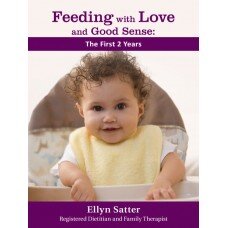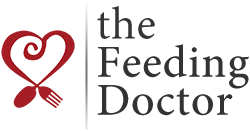What's the Best Baby-Feeding Guide? Your Baby!
Trust me, I know what I'm doing...
Part of the reason so many parents get into feeding trouble is that they often lack quality support or information. Without trusted family nearby, and with pediatricians and family doctors who may not know much about feeding, parents often turn to the internet for advice.
Here is a resource from the Johns Hopkins website that a parent on FB shared with me. This Hopkins page baffled me with some of the feeding advice for parents:"Begin with small amounts of new solid foods--a teaspoon at first and slowly increase to a tablespoon." (Um, what if the infant doesn't want any, or is eating eagerly and wants more? My big, healthy baby ate many tablespoons of food on many occasions, some occasions she ate nothing. How slowly to increase? Over a day, a week, ten minutes? I'm confused.)"Infant cereals with iron should be given to your infant until your infant is 18 months old." (I haven't heard this before, and can't imagine most 18 month-olds wanting to eat baby cereal. By 18 months, the toddler should be enjoying mostly the same foods as the rest of the family.)"Feed all food with a spoon. Your baby needs to learn to eat from a spoon." (What? Does a baby really need to learn from a spoon? All the parents who intuitively allow the baby to feed himself if he wants to, and all the moms and babies who love Baby Led Weaning, might disagree.)"Feeding your baby solid food too early may lead to overfeeding and being overweight." (I get annoyed when it doesn't mention that feeding too early, which can invite feeding battles, is as likely to cause weight dysregulation on the other extreme and make feeding a negative experience, contributing to poor eating and poor weight gain...)Overall the language is prescriptive, with absolute ounces, confusing advice and tables, and words like "needs to" and "should" and "begin"... There is very little about responding to the baby.What is your reaction?
A Better Resource: Satter's Guide to Following Your Baby's Lead
 Satter's latest resource, continues to focus on helping you follow your child's lead with feeding, while helping you do your jobs to support her eating (Division of Responsibility). It's a new booklet from Ellyn Satter MS, RD. I just got it from the publisher last week, and it's fantastic*. Satter's feeding model has been around for decades, and helps parents feed in a responsive and tuned-in way. Increasingly, research is confirming that responsive feeding supports internal regulation and eating competence.Contrast Satter's advice to that from above:"Let her eat her way— fast or slowly, steady or start and stop.""Let her eat a lot or a little. Don't make her eat a certain amount.""Offer solids based on what your baby can do, not on how old he is.""Getting to grown-up food... Feed him when is is a little hungry, between breast or after part of the bottle...""Stop when he shows you he is done, even if he did not eat.""Give him a tablespoon or two of each food; let him have more if he wants it."How does this advice feel to you?It boils down to this wisdom from a mom on my facebook page where we were having a great discussion about another feeding guideline that advised to not allow an infant more than 32 ounces of formula a day:"Basically I dislike any advice that allows others to justify telling me to go against my baby's cues and my judgment."* I receive no financial reward or other incentive to review materials, Ellyn Satter's included, which I recommend frequently.
Satter's latest resource, continues to focus on helping you follow your child's lead with feeding, while helping you do your jobs to support her eating (Division of Responsibility). It's a new booklet from Ellyn Satter MS, RD. I just got it from the publisher last week, and it's fantastic*. Satter's feeding model has been around for decades, and helps parents feed in a responsive and tuned-in way. Increasingly, research is confirming that responsive feeding supports internal regulation and eating competence.Contrast Satter's advice to that from above:"Let her eat her way— fast or slowly, steady or start and stop.""Let her eat a lot or a little. Don't make her eat a certain amount.""Offer solids based on what your baby can do, not on how old he is.""Getting to grown-up food... Feed him when is is a little hungry, between breast or after part of the bottle...""Stop when he shows you he is done, even if he did not eat.""Give him a tablespoon or two of each food; let him have more if he wants it."How does this advice feel to you?It boils down to this wisdom from a mom on my facebook page where we were having a great discussion about another feeding guideline that advised to not allow an infant more than 32 ounces of formula a day:"Basically I dislike any advice that allows others to justify telling me to go against my baby's cues and my judgment."* I receive no financial reward or other incentive to review materials, Ellyn Satter's included, which I recommend frequently.

